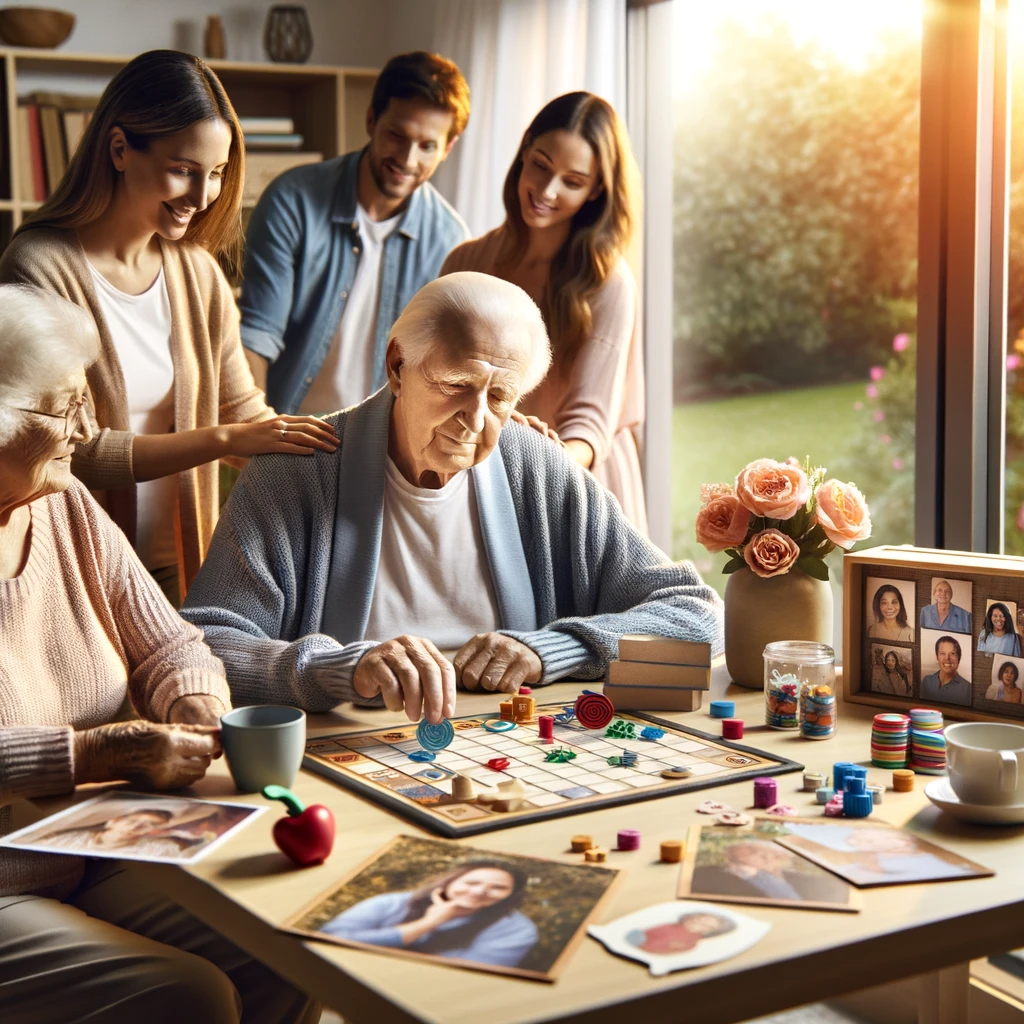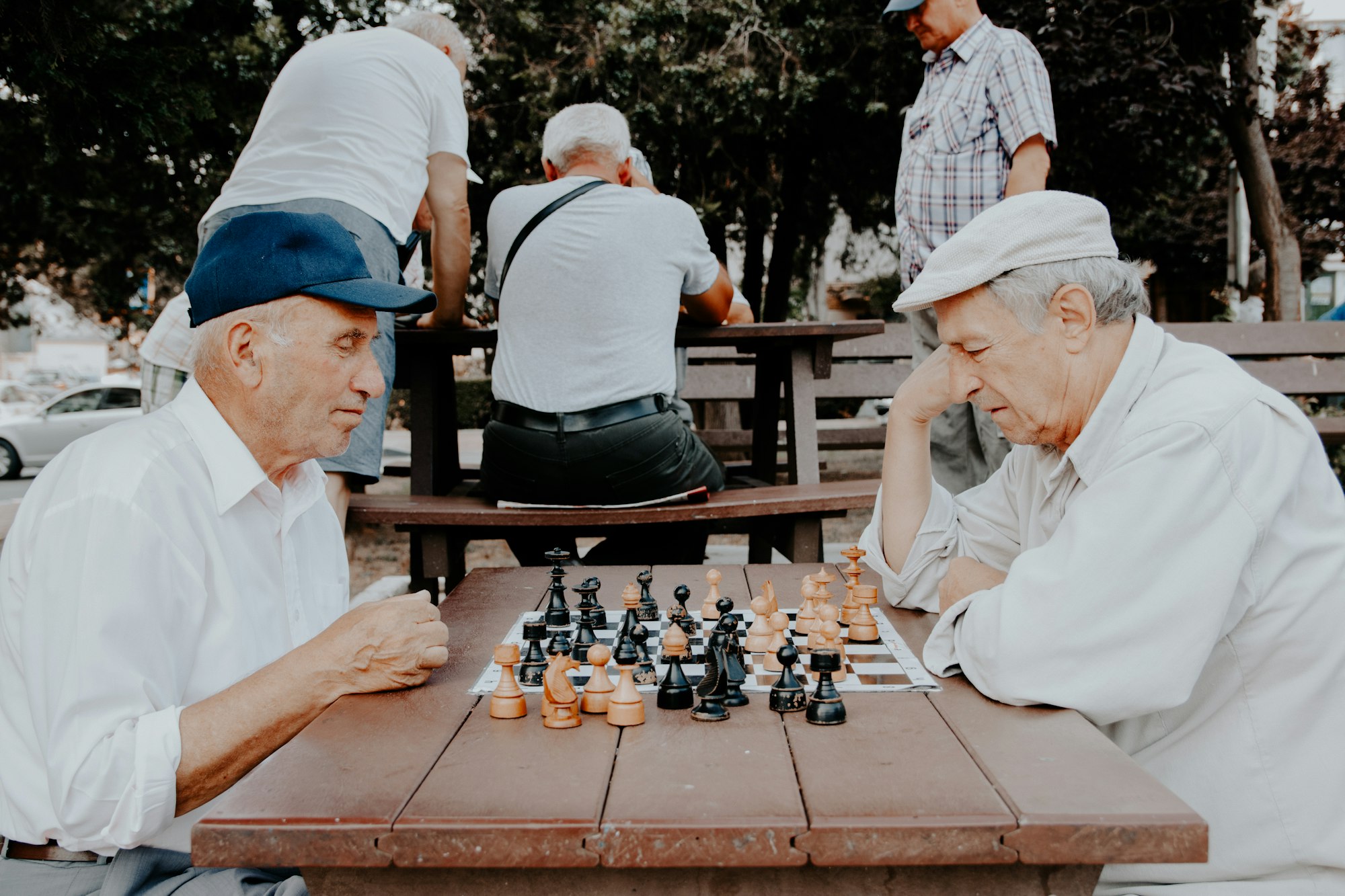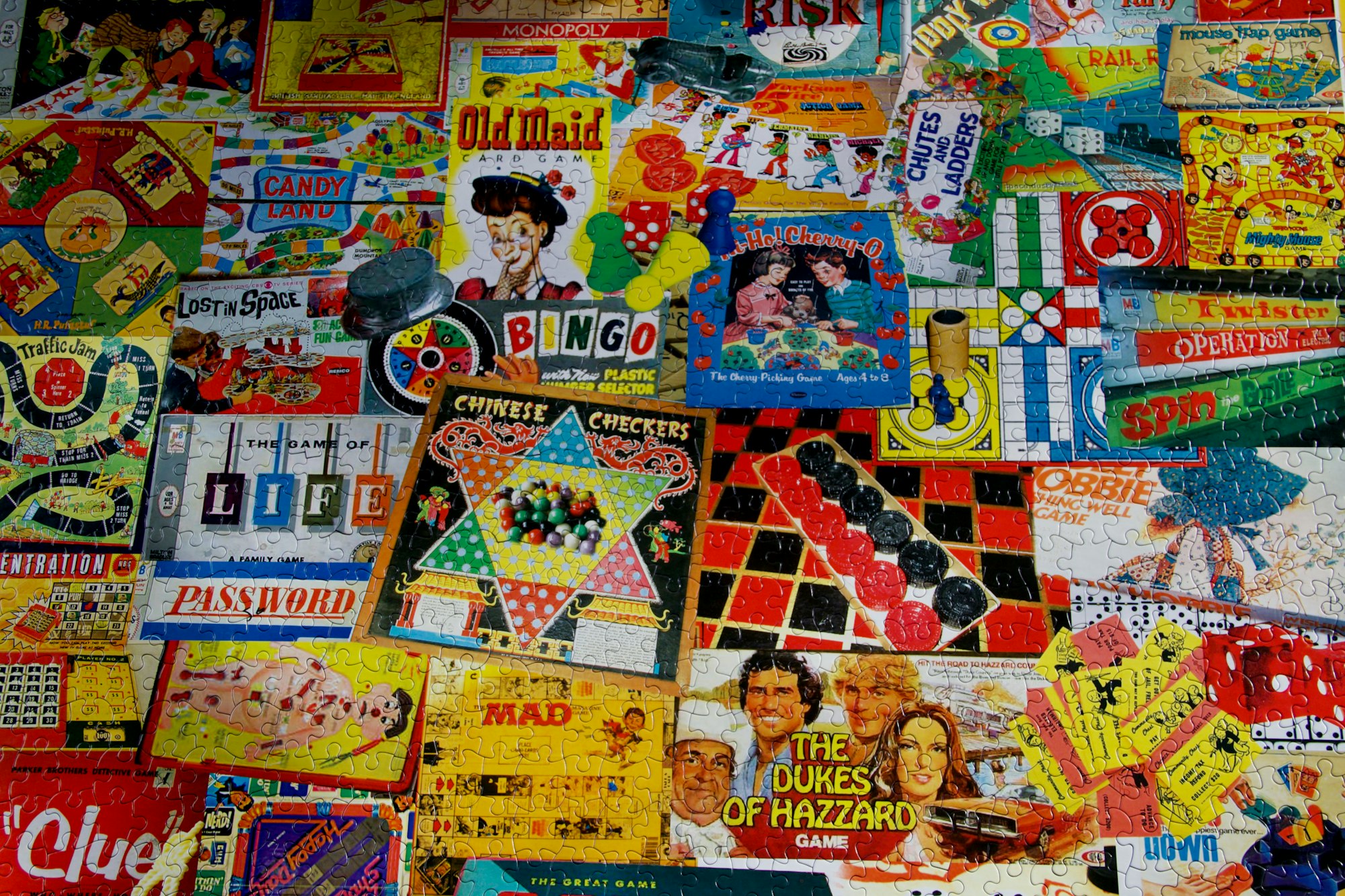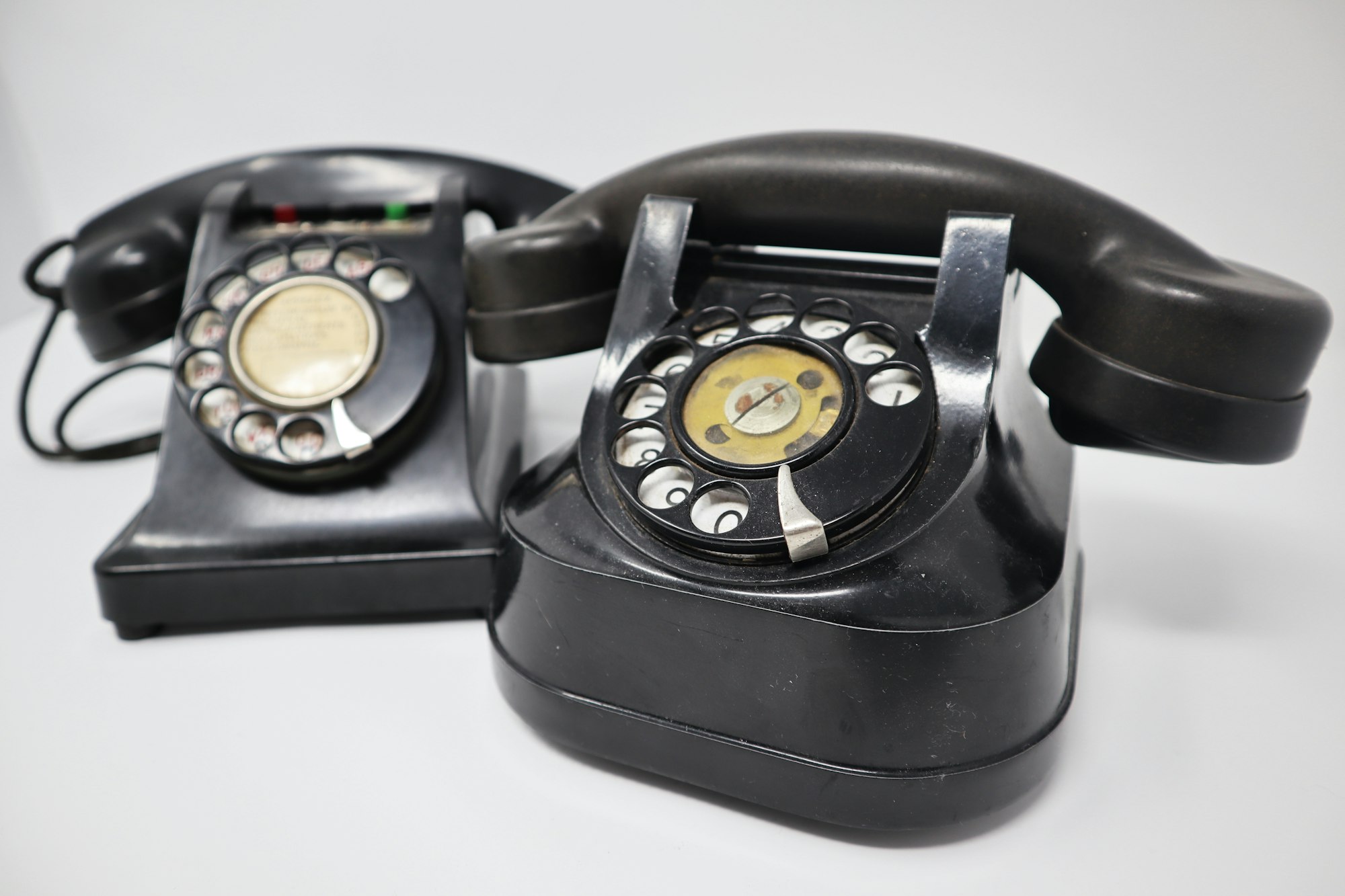25 Activities for Dementia Patients at Home
Discover a variety of activities for early-stage dementia patients in this guide. It includes indoor/outdoor activities, physical exercises, and cognitive games, all aimed at boosting cognitive health, emotional well-being, and overall quality of life for both patients and caregivers

Dementia, encompassing conditions like Alzheimer's disease, often leads to cognitive decline. Engaging in various activities can be beneficial for those in the early stages of dementia, offering cognitive health benefits and maintaining a connection with daily life.
Engaging in meaningful activities is vital for individuals with dementia, including those in the early stages of Alzheimer's disease. These activities not only enhance their quality of life but also potentially slow the progression of the disease by keeping them physically and cognitively active.

Importance of Activities:
Combat Inactivity: Dementia patients often lead a sedentary lifestyle, which can lead to weight gain, muscle loss, weakened bones, and other health issues like heart disease, high blood pressure, and diabetes.
Reduce Symptoms: Regular involvement in activities can lessen symptoms like depression and anxiety, and may slow dementia's progression.
Types of Activities:
Indoor Activities: Creative tasks like crafting, cooking, and engaging in digital photography stimulate cognitive skills and offer a sense of accomplishment. Games like chess, dominoes, or board games can also be enjoyable and mentally stimulating.
Outdoor Activities: Simple outdoor tasks like gardening, feeding birds, or walking through a park not only provide fresh air and exercise but also improve neuropsychiatric symptoms.
Physical Exercise: Low-impact exercises like chair yoga, tai chi, or water aerobics are beneficial for maintaining physical health and mobility.
Social Interaction: Group activities like singing, drama groups, or memory cafes encourage socialization, which is crucial for emotional well-being and cognitive health.
- Technology Use: Video calls and interactive games on dementia-friendly apps can help maintain connections with loved ones and offer mental stimulation.

Benefits of Specific Activities:
Household Tasks: Engaging in simple household chores helps maintain a sense of normalcy and usefulness.
Memory Care: Activities like looking at family photo albums or creating a memory box can trigger memories and promote emotional connections.
Community Involvement: Participating in community events, attending dementia-friendly cinema screenings, or visiting local places like museums can provide sensory experiences and social engagement.
Caregiver's Role:
Plan and Supervise: Caregivers should ensure activities align with the person's current abilities and interests. Activities should be safe, enjoyable, and tailored to the individual's residual skills.
Encourage Self-Care: Encouraging self-care activities like grooming or hand massages can enhance a person's sense of self and well-being.
Focus on Emotional Connection: Activities should aim to foster an emotional connection, helping the person with dementia feel valued and included.
Professional Consultation: Consulting healthcare professionals like doctors, nurses, or occupational therapists is crucial to ensure activities are appropriate and beneficial for the individual's health status.
Incorporating a variety of activities into the daily routine of a a person living with dementia can significantly improve their quality of life. These activities provide mental and physical stimulation, reduce the risk of depression and anxiety, and maintain a sense of purpose and connection with others.

Indoor Activities for Dementia Patients:
Old Photos: Browsing through family photos and photo albums can trigger fond memories and provide sensory stimulation.
Music: Listening to familiar tunes, especially holiday songs, can evoke memories and improve mood.
Arts and Crafts: Creative activities like painting or knitting offer a sense of achievement and self-esteem.
Pet Interaction: Pet therapy, including cuddling or walking a pet, boosts emotional well-being.
Musical Instruments: Playing instruments, possibly those familiar from earlier in life, enhances cognitive skills and social interaction.
Household Chores: Simple tasks, like folding laundry, give a sense of usefulness.
Television: Watching favorite shows or movies can engage and entertain. Please be aware that there will come a time when the TV is a distraction. Some will not be able to discern what is real and what is not. Be aware of what is on TV such as horror movies or the news can be harmful behaviors cause agitation and challenging behaviors.
Outdoor Activities for Those with Dementia:
Gardening: Therapeutic gardening improves cognitive function and emotional state.
Walks in Nature: Regular exercise like walking, particularly in places like a dog park, offers physical and mental benefits.
Catch Games: Soft ball games enhance a person's physical, activity and social bonds.
Bird Watching: Feeding and observing birds in a large fish tank or outdoors can reduce stress and anxiety.

Physical Exercises:
Dancing: Engaging in dance improves attention and memory
Yoga and Tai Chi: Activities like yoga and tai chi boost cognitive function and mood.
Treadmill and Weightlifting: These exercises can enhance cognitive abilities and physical health.
Cognitive Activities:
Puzzles: Jigsaw puzzles and crossword puzzles stimulate the mind and offer a sense of achievement.
Board Games: Simple games keep the mind active and encourage social interaction.
Reading and Storytelling: This can stimulate the imagination and reconnect people with dementia fond memories.
Card Games: Card games improve memory and cognitive skills.
Memory Box: Creating a box filled with meaningful items from their life can help in recalling recent events and personal history.
Social Activities:
Book Clubs: Joining a dementia-friendly book club encourages social interaction and cognitive engagement older adults.
Support Groups: Dementia support groups offer emotional support community resources and understanding.
Video Calls with Family: These calls help maintain connections with family member and reduce feelings of isolation.
Religious Services: Attending services in local community can provide spiritual comfort and a sense of community.
Planning Activities:
When planning activities for someone with dementia, consider the person's current abilities and interests. Ensure activities are safe, engaging, and align with their residual skills. It's important to maintain a routine and adapt activities as dementia progresses, focusing on sensory experiences and activities that can improve overall well-being.
Summary:
Activities for dementia patients should be tailored to their stage and abilities, promoting engagement, cognitive health, and emotional connection. Incorporating a mix of physical, cognitive, and social activities can significantly enhance the quality of life for people living with dementia and their other family members and caregivers.
More on Dementia Activities at Home
Welcome to caregiver relief. This is Diane carbo, your host today, and our hot topic for today's presentation is activities for people with dementia. Let's get started. Activities for people with dementia are important at all. Stages of the disease. These activities will vary depending on the stage of the disease, the physical and cognitive ability of the person with dementia, as well as their age.
The goal of these activities will be to offer variety, to achieve things such as helping the person with dementia remain happy and positive, which is essential to staving off depression, maintain a level of self-worth in those who are in the earlier middle stages and to improve their sense of wellbeing, maintaining some level of physical and mental condition is.
For some, this may even slow the progression of the disease. These activities could also help care partners taking care of somebody with a debilitating disease can be challenging for anyone. This is true, no matter how strong the relationship between the caregiver and the family member was to begin with a focus on special routines and practicing mindful.
Can be beneficial to both the caregiver and the family member. This is usually pivotal in enhancing patient care. It has also been shown to delight, to delay cognitive decline. It also decreases the stress levels of the caregiver as they are less likely to find a task caregiving, unmanageable choosing the right routine.
Well help the patient find the kind of structure that helps them to overcome some of the challenges they face and for the caregiver, this lessens the workload as it is easier when the patient, as it easier as it is for the patient, the less challenging things will be for the caregiver. It also helps strengthen the bond between the patient and the family member, caring for forward.
Many of the ideas for keeping the patients mentally and physically occupy involve the caregiver as well. And the caregiver benefits directly by learning new ways to cope with some challenges, they've faced some activities for people with dementia, the types of activities for individuals with dementia.
It depends a great deal on the stage they are in and the type of dementia they are suffering. The truth is people coping with this disease can still enjoy a range of activities since the men just such as Alzheimer's disease tends to Rob suffers of their memory. Memory games are very important in the early stages of the disease in the early stages of dementia, many people can still follow instructions.
It is a good idea to encourage games that call for remembering things and talk. Memory games or brain games such as playing cards, reciting nursery, rhymes, board games, or even talking about that history or life events are great activities. Some activities you may want to partake in are puzzles and card games to help sharpen the memory, simple crafts or activities that your family member enjoyed before they may enjoy it.
Basic household tasks will not only help keep the person with dementia active. It allows them to continue to go useful and independent, of course, listening to their favorite music. Not only helps provide memories for them. It's also a great way to relax outdoor activities like gardening or like yard work, or also morale boosters in the very early stages of dementia.
Depression may follow. Once a person has been newly diagnosed. This, this person may not want to do anything. They lose their motivation, getting the person with dementia interest in something that you like is especially important at this stage. It can, however, be proved to be a difficult task for you to encourage and motivate them.
Journaling is a popular and useful activity. To help those in the early stages to deal with their feelings and the emotions they are going through as physical abilities and the census decline, it is important to incorporate movement into their life dancing or even taking walks and talking are especially beneficial.
If the person is still able to do simple tasks, such as cleaning, folding clothes or other basic things. These should be encouraged to do so. Here is a list of some simple pleasurable activities that you may want to consider in the early stages of dementia. Read the daily paper. Reader's digest out loud, ask a friend with a baby or a child to visit plants, seeds, indoors, and out.
Take time to look at family photos and enjoy them. Say, tell me more. As they talk about memories, have a neighbor or a friend with a calm pet visit, take time to sing holiday songs to spark memories. The progression of the disease usually means that over time there will be increased difficulty, remembering familiar faces, events, and tasks.
The ability to do some of these activities will be. These activities will not return. There may be successive reward preforming the most often repeated tasks, but this is not true for every person. This does not mean that these tasks should be put aside as the person with dementia may still get some enjoyment from the activity, but the care partner must be careful to avoid anything.
That may lead to frustration. More guidance may be necessary if the light stages, as the person tries to cope and get things done and activity that will provide a sense of accomplishment to the person with dementia is always important. The care partners must assist and give praise and positive feedback in an upbeat tone of voice.
In the mid to late stages of dementia,it also must be understood that words may not be understood as much as the way or the tone. Something is said as a function or ability to do something is lost. It is important to focus on the abilities that are still present. More guidance and support may be necessary to accomplish the task at this time.
And then as the person tries to cope and get things done, Maddie activities for people with dementia are useful in helping keep them active and happy. Physical activities are helpful in maintaining muscle mass, which is important. As some people will eventually experience a loss of fine motor skills and even their ability to walk or be mobile activities, prevent boredom and.
Decrease or prevent challenging or negative behaviors. As we said before, the truth is people coping with this illness can still enjoy a range of activities. Medical professionals often stress the need to remain active, not only as a weak means of coping as well as to keep the person with dementia and care in their care partner up.
I would like to take time to make episodes. One last point for activities were seniors with dementia. The importance of music in a person with dementia can make a difference. It can calm them or could cause a connection to a wonderful memory. Listening to familiar music can make a difference, even in the later stages of dementia.
Thank you for joining us today. Activity. People with the mental was brought to you by caregiver relief. I hope you will join us in the future.
FAQ: 25 Meaningful Activities for Dementia Patients at Home
Why are meaningful activities important for people with dementia?
Meaningful activities provide emotional connection, stimulate cognitive function, and promote positive emotional experiences. They also offer health benefits, improve mood, and reduce symptoms of cognitive decline.
How can physical activity benefit people with dementia?
Gentle exercises, such as walking, tai chi, or stretching, can improve cardiovascular fitness, boost physical abilities, and enhance overall well-being. Physical activities also help reduce challenging behaviors by keeping the person actively engaged.
What types of creative activities are helpful for dementia patients?
Creative activities such as painting, drawing, or making a memory box provide sensory stimulation and offer a way to evoke fond memories, which can help maintain cognitive abilities and improve self-esteem.
How can I plan engaging activities as dementia progresses?
As dementia progresses, focus on simpler, low-stress activities that encourage social interaction and positive emotional connections. Activities like folding laundry or looking through family photo albums are safe and comforting.
What are some sensory activities for people with dementia?
Sensory activities such as listening to holiday songs, pet therapy, or handling familiar mementos stimulate the senses and evoke comforting memories, offering therapeutic benefits and reducing agitation.
Can household tasks be effective dementia activities?
Yes, familiar household tasks like folding laundry or organizing items provide a sense of purpose and engage residual skills. These activities also support cognitive function and keep people with dementia active in their daily routine.
How can family members participate in dementia activities?
Family members can join in activities such as board games, jigsaw puzzles, or outdoor walks. These shared experiences strengthen bonds and create positive emotional connections while keeping the person with dementia socially engaged.
Are cognitive activities important for people with dementia?
Yes, cognitive activities like strategic thinking games, jigsaw puzzles, or reminiscing about past events can help stimulate memory and slow cognitive decline. They are important for maintaining mental acuity.
How can outdoor activities help dementia patients?
Outdoor activities such as visiting a dog park, taking nature walks, or light gardening provide fresh air and physical movement, which improves overall well-being and reduces stress.
What are some leisure activities that benefit people with dementia?
Leisure activities like photo albums, therapeutic coloring, or watching favorite movies evoke comforting memories and provide relaxation. These activities create moments of joy and comfort for the individual.
How do sensory experiences affect dementia patients?
Sensory experiences like touching familiar objects, listening to soothing music, or smelling favorite scents can evoke comforting memories and help reduce agitation, improving the person’s emotional state.
How can healthcare professionals help plan dementia activities?
Healthcare professionals can provide advice on activities based on the person’s physical and cognitive abilities. They can recommend specific therapeutic activities or sensory experiences to reduce symptoms and improve quality of life.
Are family photo albums helpful for dementia patients?
Yes, family photo albums are an excellent tool for stimulating memory, encouraging conversation, and fostering positive emotional connections. They allow patients to reminisce and engage in meaningful social interaction.
What are the health benefits of keeping dementia patients physically active?
Keeping dementia patients physically active through gentle exercises or household tasks improves cardiovascular health, reduces the risk of high blood pressure, and helps maintain mobility and overall physical well-being.
Can pets or pet therapy help people with dementia?
Yes, pets or pet therapy provide emotional comfort, sensory stimulation, and social interaction. They can reduce stress, lower blood pressure, and evoke fond memories for dementia patients.
What are fun activities for dementia patients?
Fun activities include singing familiar songs, baking simple recipes like holiday desserts, or doing jigsaw puzzles. These engaging activities promote cognitive function while providing enjoyment and emotional satisfaction.
Can community resources help with dementia activities?
Yes, many community resources, such as online communities, local dementia support groups, and healthcare professionals, offer activity ideas and support for caregivers planning engaging activities for dementia patients.
How can planning activities help reduce challenging behaviors in dementia patients?
Planned activities, especially those that match the person’s cognitive and physical abilities, help reduce challenging behaviors by providing structure, engagement, and purpose, which reduces anxiety and agitation.
What activities are suitable for late-stage dementia?
For late-stage dementia, focus on gentle, sensory activities like listening to music, holding a pet, or touching soft materials. These activities can provide comfort and connection without overwhelming the individual.
How can activities promote social interaction for dementia patients?
Activities that involve family members, like board games or storytelling, promote social interaction and foster emotional connections, helping the person feel supported and engaged.
What cognitive activities are best for stimulating memory?
Cognitive activities like sorting old family photos, playing strategic board games, or creating a memory box help stimulate memory and maintain cognitive abilities in dementia patients.
Can sensory stimulation improve cognitive function in dementia patients?
Yes, sensory stimulation through activities like pet therapy or handling familiar objects can improve cognitive function by engaging different parts of the brain and promoting positive emotional responses.
How can people with dementia remain physically active?
People with dementia can remain physically active through gentle exercise, like stretching, tai chi, or simple household tasks such as folding laundry, which help maintain mobility and physical health.
What are some easy planning activities for dementia patients?
Simple planning activities include preparing meals, folding clothes, or organizing items. These activities offer a sense of control, purpose, and structure to their daily routine.
How can a person’s doctor help with dementia activities?
A person’s doctor can recommend activities based on the individual’s health and cognitive abilities. They may also suggest health professionals who specialize in therapeutic activities to manage symptoms and enhance quality of life.
You might also like this article:













